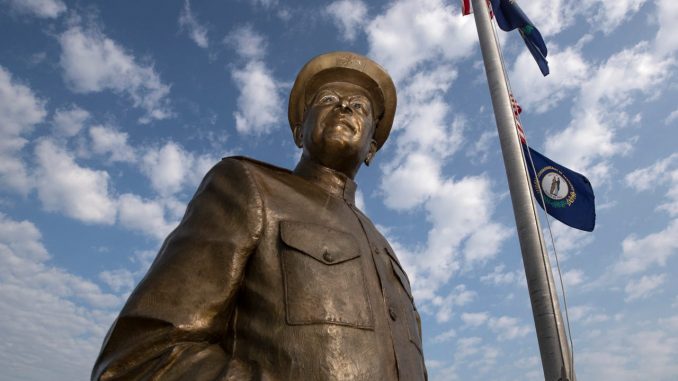
HENDERSON, Ky. — Inside a packed school auditorium, hundreds of angry citizens, some holding Ten Commandments placards, shouted “Amen!” as fiery speakers denounced a proposed LGBTQ rights ordinance.
The “homosexual agenda,” some opponents warned, could turn young people gay and destroy their Kentucky town.
It was the fall of 1999.
The farming and industrial town of 28,000 perched on the Ohio River, had become the third and smallest city in Kentucky, following Louisville and Lexington, to consider a “Fairness” ordinance protecting gay, lesbian and transgender residents from discrimination in employment, housing and public accommodations.
The combustible debate, stoked by conservative religion, divided the small town like never before.
The gay pastor leading the fight faced threats. Protesters shouted insults into bullhorns.
‘Not all country boys are bigots’: Photo of duct tape Pride flag on truck goes viral
One hearing drew more than 800 people and lasted until 2 a.m. Police ran safety checks on city commissioners.
“The things said by the opposition was unreal,” said Phyllis Ward, a retired school guidance counselor whose husband was on the commission. “Death to people who are gay. Shoot ’em. Get rid of ’em. They’d say it right out, holding the Bible in their hands.”
The ordinance passed on a 3-2 vote with support from then-Mayor Joan Hoffman, a seemingly improbable victory for LGBTQ civil rights in rural America.
But it wouldn’t last.
Within 18 months, city commission elections, marked by campaign promises to reverse the new law, tilted control to opponents who repealed it. It left advocates defeated, LGBTQ residents on edge and some civic leaders reluctant to revisit the issue.
Now, 20 years after that tumultuous chapter in Henderson, the city commission on Tuesday is expected to give final approval, on the same 3-2 vote, to a similar Fairness ordinance after a campaign that Hoffman spearheaded.
Hoffman, now a private citizen, says it is long past due.
This time, the debate has been notably devoid of 1999’s anger and vitriol. Fears that it would reignite a public anti-gay outpouring haven’t come to pass.
A forum in May drew fewer than 90 people, mostly supporters. Even staunch opponents, who dismiss it as unneeded or a slippery slope toward curtailing Christian religious values, doubt passage will spark another repeal attempt.
To many, the stark difference is the latest sign of the larger picture of growing LGBTQ acceptance in rural America.
In recent years, Americans’ views toward LGBTQ people have shifted substantially, with a majority of U.S. adults now saying society should accept homosexuality, according to the Pew Research Center.
“As the country has changed, so has Henderson,” said supporter and resident Glenda Guess, noting Tuesday’s second reading will come four years after the U.S. Supreme Court legalized same-sex marriage, another milestone she didn’t think she’d see.
“We’d like to think it’s because people are more educated,” but at the very least more “people know it’s no longer cool to say, ‘I can’t stand gay people,'” she said.
(snip)
Has the needle moved in favor of LGBTQ rights?
So how many residents in Henderson have changed their minds in the intervening years?
Kentucky State Sen. Robby Mills spent 18 years as a city commissioner and helped repeal the law. He opposes the latest version as “a club that can be overused.”
And he said he doesn’t think attitudes have shifted as much as it seems — at least not in Henderson County.
Mills had just returned from a legislative conference in Denver, during gay pride week, attending a baseball game where the country’s first openly gay governor threw out the first pitch. He said LGBTQ advocates had successfully “sold their issue,” particularly in urban areas.
“But in rural America, it is still not something that people easily talk about,” he said, arguing that because of “political correctness” and divisions in the era of Donald Trump, people are afraid to talk about politics. “It was 50-50 back then, and I don’t think the needle has moved that much in Henderson County.”
A 2017 Public Religion Research Institute survey found that about 52% of rural residents support same-sex marriage, compared with 64% of urban residents, while 62% supported nondiscrimination measures for LGBTQ people, compared with 72% of urban residents.
When the Henderson City Commission takes its final vote on the ordinance, already approved in a first reading 3-2, it is expected to pass on the same lines.
“Two of the three commissioners that voted in favor of it are relatively young folks, and sometimes young folks have a different idea about things. Their lifestyle is different,” Mayor Austin told WKU Public Radio.
Among them is Austin Vowels, a 32-year-old lawyer, who believes the ordinance is needed, particularly after reading more than 30 letters from LGBTQ residents and others in support.
“It’s the right thing to do,” he said. “I’d like to think we’re progressing, but it’s hard to say.”
*see full story by USA Today